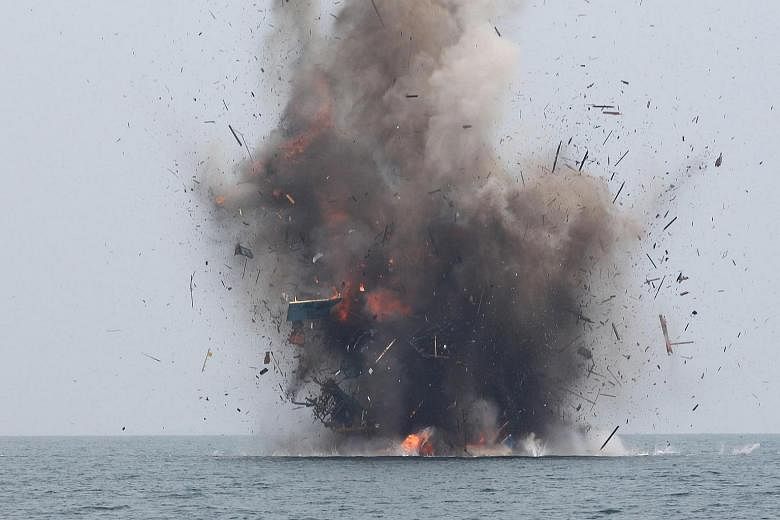JAKARTA (Bloomberg) - Indonesia will cap its Independence Day celebrations on Wednesday (Aug 17) by scuttling as many as 71 impounded foreign vessels - mostly Vietnamese but also a handful of Chinese - to signal its determination to protect its sovereignty over lucrative fishing grounds in the South China Sea.
The destruction of the boats comes amid simmering regional tensions over territorial disputes in the water. Former Indonesian foreign minister Marty Natalegawa said the main challenge facing the country was to ensure the message was not misinterpreted.
Mr Natalegawa said the signal has to be conveyed that Indonesia is determined to protect its national sovereignty and territorial integrity. "But some of the risk in our region nowadays is precisely the risk of misperception, miscalculation, minor incidents becoming bigger crises," he said in a telephone interview last week. "The region as a whole should not lose the habit of open dialogue and diplomatic communication."
Since the end of 2014, Indonesia has destroyed more than 170 foreign vessels from various nations as it has tried to fend off Chinese claims that waters surrounding the Natuna Islands are part of traditional Chinese fishing grounds.
In June, President Joko Widodo held a Cabinet meeting on the KRI Imam Bonjol, a warship that patrols the waters, and last month Indonesia's popular Maritime Affairs and Fisheries Minister Susi Pudjiastuti said she wanted to "celebrate Independence Day this year in Natuna, where I will witness the sinking of many foreign vessels", later declaring that only Indonesians "can catch fish in Indonesia".
China's claims to more than 80 per cent of the South China Sea were dealt a consequential blow last month by an international tribunal that ruled that China had no historic rights to the resources within the waters. Indonesia is not an official claimant, and Beijing's official disputes are with other nations such as the Philippines and Vietnam.
Dr Richard Javad Heydarian, a political science professor at De La Salle University in the Philippines, believes the Natunas have already become a proxy for the broader dispute over sovereignty in the South China Sea.
"I think the message is clear: Indonesia will stand its ground and is willing to up the ante less China scales back its assertiveness in Indonesian waters," he said by e-mail.
In March, the Chinese Coast Guard collided with a Chinese fishing boat suspected of illegal fishing as it was being towed by Indonesian authorities.
Two weeks later, Indonesia destroyed 23 foreign vessels, blowing a number of the boats up in a public display broadcast on the Internet.
Prof Heydarian said that while Jakarta had not been as confrontational toward Beijing as Vietnam or the Philippines, it was also clear Indonesia would not be a pushover in maritime disputes. "It has effectively become a claimant state in the greater South China Sea showdown," he said.
The government in Jakarta must also tread a fine line between insisting on Indonesia's territorial integrity and acknowledging that it relies on money from China to fund infrastructure and boost growth. China overtook the US, Singapore and Japan in the past decade to become Indonesia's largest trading partner with US$49.2 billion in transactions last year, up from US$16.3 billion in 2006.
Mr Natalegawa, 53, who was foreign minister under former president Susilo Bambang Yudhoyono, said China's claim to the waters surrounding the Natunas are part of an attempt to test the status quo.
"Never traditional fishing grounds," he said. "That was how the constellation was, the equilibrium that we had with China on this issue."
Until recently, Mr Natalegawa added, there had never been a maritime territorial dispute between China and Indonesia. "It seems to me there has been some kind of qualitative development on the issue when China begins to speak of having differing interpretation of the maritime boundary or speaking of their traditional fishing grounds," he said.

